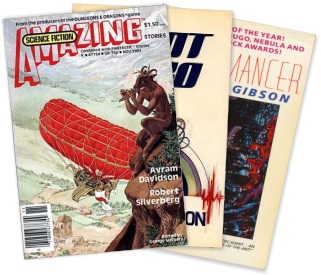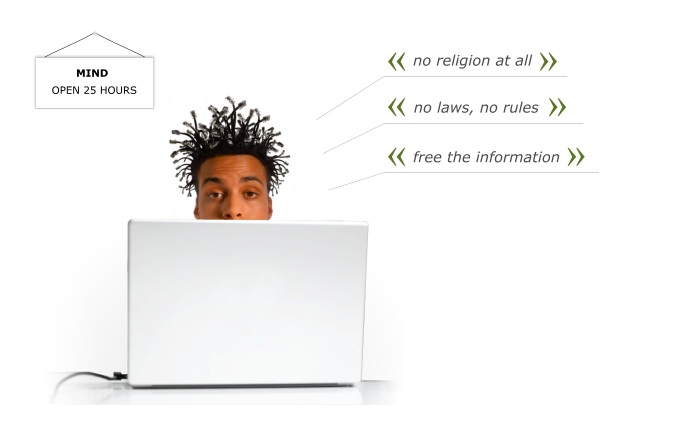| » | ||||||||||||||||
The main direction in the cyberculture is the movement of cyberpunk. The term «cyberpunk» was coined for the first time in the short story «Cyberpunk» by Bruce Bethke published in «Amazing Science Fiction Stories» magazine in 1983. Cyberpunk — is it just another show-off of modern society, like the neo-hippies «turned around» the whole world in 60s; or is it just a buzzword?
First of all, cyberpunk is a new genre appeared in the world literature of 80s. An American author William Gibson is considered «the father of cyberpunk». However, Gibson himself doesn't like the term «cyberpunk» and regards it as a marketing trick. The most famous cyberpunk writers are: Bruce Sterling, Phillip K. Dick, John Shirley, Lewis Shiner. The new for that time science fiction genre usually narrated about the confrontation of human beings and cyborg-machines, the struggle for existence of the human mind against the artificial intelligence of robots. We call this the «postmodernist fiction of 80s».
The cyberpunk is not only a direction in science fiction but a youth movement. Moreover, we consider cyberpunk as a lifestyle where virtual reality plays a great role. As a matter of fact, the main idea of the cyberpunk is that, as a result of development of information, electronic and virtual technologies borders between the person and machine are irrevocably washed away. Movement of cyberpunks is clearly distinguishable by the extreme individualism and an isolation of its participants from social processes.
Typical cyberpunk in front of us as is: emotionless face, look from a mind spending 25 hours (an hour for lunch) in the cyberspace, a mind «integrated» to the virtual world. Like real drugs were stimulator for punks, cyberspace is a drug for cyberpunks. There is no need to describe cyberpunks as ones with coloured hair in leather and all covered with piercing. The cyberpunk is inside the person. They are nihilist who deny any religion, government and don't stand for any rules. What they stand for is the freedom of the information. «Information wants to be free!» — that is what punks claimed and that is what cyberpunks claim as a distinctive slogan. Cyberpunks do not express their feelings to outside world: virtual smilies — that’s what comes for emotions. Emoticons replace the emotions: sitting with apparent neutral face, they are sending lots of «Laughing Out Loud»-smilies to their virtual buddies, friends on the other side of the line. There is no sense of time for cyberpunks: time continuum is not their friend. Perhaps «time machine», at least virtual, is to be invented by cyberpunks?
Many periodical issues debate on quite rhetorical for cyberculture question, whether World Wide Web nowadays killed cyberpunk and that the latter became neglected; some of them say that «As a genre, cyberpunk is washed up, as outmoded as a 1980s hard drive». We reckon that web didn't kill it; web became a new environment for a new young subculture of cyberpunks — netizens. Like the energy, by «conservation of energy law», doesn't disappear to anywhere but transfers from one type to another, new young subculture, net culture, gave further growth to cyberculture that is originally born from «cyberpunk» literature genre with its imaginative characters — cyberpunks. For sure, cyberpunk movement has its own possessions. In our next section we will have a look at these possessions cyberpunks are known for. |
||||||||||||||||
 |
our team | copyright |
|
||||||||||||||||||||||||
This website is developed for educational purposes in the context of |
||||||||||||||||||||||||
 It was a little story about a gang of teenage hackers, and further author’s attempt to find the connection between the high technology and the behaviour of punk. These two words «cyber» and «punk» accentuate the two essential characteristics of cyberpunk: technology and individuality.
It was a little story about a gang of teenage hackers, and further author’s attempt to find the connection between the high technology and the behaviour of punk. These two words «cyber» and «punk» accentuate the two essential characteristics of cyberpunk: technology and individuality.